The Deepwater Horizon disaster changed the lives of millions living near the Gulf of Mexico – as well as the scientists who responded to the crisis. These are some of their stories… intimate portraits of research – innovation – discovery.
• Watch short videos on the Dispatches YouTube channel.
• Listen to GulfCast, the Dispatches Podcast.
• Get the full documentaries on DVD.
Meet the Scientists, Watch the Scientists, Listen to the Scientists
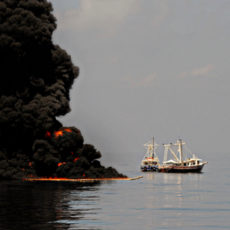
Short Videos
* Watch videos on the Dispatches YouTube channel.
The Deepwater Horizon disaster changed the lives of millions living near the Gulf of Mexico – as well as the scientists who responded to the crisis. These are some of their stories… intimate portraits of research – innovation – discovery.
Continue reading...
Continue reading...
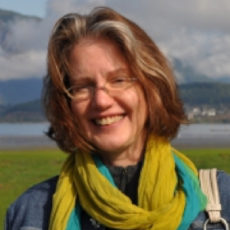
CJ Beegle-Krause
Institution: SINTEF, Department of Marine Environmental Technology
Beegle-Krause’s areas of expertise include hydrodynamic modeling, chemical and hydrocarbon trajectory modeling, diagnostic modeling, numerical modeling, sampling experience, and data analysis. Her employment history spans consulting, corporate, academic, and government physical oceanography jobs. She worked as lead trajectory modeler, 24-hour spill response trajectory analyst, and modeler of oil spills, airline disasters, search and rescue, and floating items and debris, including support for Department of Defense (U.S. Joint Forces Command and Naval Oceanographic Office).
Education: Ph.D., Physical Oceanography, University of Washington
Continue reading...
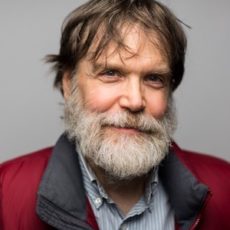
Eric D’Asaro
Institution: University of Washington, Applied Physics Laboratory
Dr. D’Asaro’s research spans a wide number of environments from upper ocean mixed layers to nearshore coastal fronts to fjords to deep convection. It retains studies of turbulence and internal waves, but has increasingly moved toward understanding the role of these ocean mixing processes in controlling biochemical processes in the ocean, especially gas exchange and biological productivity. By measuring big signals, like hurricanes or major blooms, it is easier to unravel the underlying processes because the signal to noise is high.
For the past 20 years, D’Asaro has focused on exploiting the unique capabilities of “Lagrangian Floats”, a class of instruments that try to accurately follow the three dimensional motion of water parcels particularly in regions of strong mixing. This turns out to be a novel but effective way to measure turbulence in regions of strong mixing. Dr. D’Asaro collaborates with ocean biologists and chemists to design and operate multidisciplinary floats.
Education: Ph.D. Oceanography, MIT/WHOI, 1980; M.S. Applied Physics, Harvard University, 1976
Continue reading...
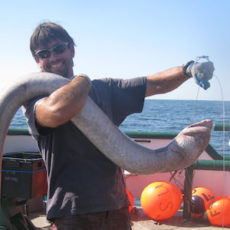
Dean Grubbs
Institution: Florida State University, Coastal and Marine Laboratory
Dr. Grubbs’s primary research interests are in ichthyology and marine ecology with emphasis on the biology of exploited estuarine and marine fishes. Much of my research addresses management of fisheries resources, especially elasmobranch fishes. He uses fishery-independent survey methods to study population dynamics, life histories, and distribution patterns of fishes. He also use conventional mark-recapture studies and modern telemetry techniques to acquire data on movement patterns, habitat use, residency and philopatry. A principal goal of this line of research is to delineate essential and vulnerable habitats, especially in estuaries and nearshore marine environments. He has also been involved in projects that included diverse taxa such as estuarine teleosts and terrestrial reptiles.
GoMRI-funded Research: Deepsea to Coast Connectivity in the Eastern Gulf of Mexico (DEEP-C Consortium); Assessing Impacts of Oil Exposure to Deep Sea Ecosystems of the Gulf of Mexico Using Sharks and Scavengers As Integrative Models; Assessment of Deepwater Fish Assemblages Associated with Desoto Canyons and Continental Slope Waters in the Eastern GOM
Education: Ph.D., William & Mary University, 2001
Continue reading...
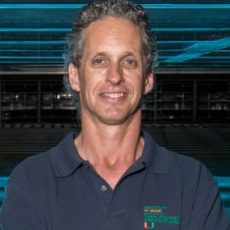
Brian Haus
Institution: University of Miami, Rosenstiel School of Marine & Atmospheric Science
Dr. Haus studies coastal ocean surface currents for application to oil spill transport prediction and response; radar remote sensing of oceanographic processes from satellites and from coastal radars; shelf and inlet dynamics; and wave-current interactions. He also does laboratory studies of air-sea interactions in extreme winds, wave dynamics, turbulence and coastal structure design in the SUSTAIN laboratory.
GoMRI-funded project: Consortium for Advanced Research on Transport of Hydrocarbon in the Environment (CARTHE Consortium)
Education: Ph.D., University of Michigan, Coastal Engineering,1992; M.S.E., Coastal Engineering, University of Michigan
Continue reading...
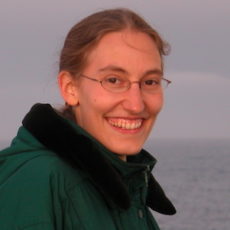
Helga Huntley
Institution: University of Delaware, College of Earth, Ocean, & Environment
Dr. Huntley studies pieces of the Earth’s climate system by using mathematical and numerical models, in connection with data. The mathematics involved ranges from partial differential equation theory to numerical methods to optimization theory to statistics.
She is currently following three main directions in her research: (1) Developing and applying Lagrangian tools to analyze ocean circulation and transport; (2) Investigating data assimilation methods (for paleoclimate reconstruction, e.g., and for Lagrangian observations); (3) Studying sea ice in the Arctic and its role in the local circulation.
Education: Ph.D., Mathematics, New York University, 2005; M.S., Mathematics, New York University, 2003
Continue reading...
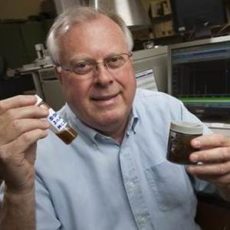
Ed Overton
Institution: Louisiana State University, College of the Coast & Environment
Dr. Overton’s research interests include understanding the fates and distributions of hydrocarbons following an oil spill, the environmental chemistry of hazardous chemicals, and the detection of environmental pollutants at the site of sample collection. Dr. Overton has been active in understanding the fate and effects of petroleum hydrocarbons in marine environments from oil spills since the 1978 well blowout at the US DOE Strategic Petroleum Reserve West Hackberry Site, followed by the Amaco Cadiz Tanker wreck and the IXTOC 1 blowout in 1979, the Exxon Valdez wreck in 1989, and currently the Deepwater Horizon fire and blowout in 2010. Dr. Overton has given hundreds of presentations at scientific symposia as well as live interviews concerning the Deepwater Horizon oil spill to international print, radio, and TV media sources.
Education: Ph.D., University of Alabama, 1970
Continue reading...
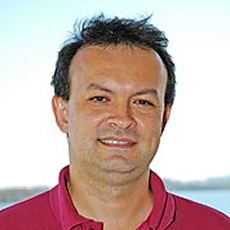
Tamay Özgökmen
Institution: University of Miami
Dr. Özgökmen’s research interest centers around the investigation of multi-scale oceanic flows using non-hydrostatic numerical models and Lagrangian methods.
GoMRI-funded project:
Consortium for Advanced Research on Transport of Hydrocarbon in the Environment (CARTHE)
Education:
Ph.D., Engineering Sciences, Dartmouth College, Hanover, New Hampshire, U.S.A.
Continue reading...
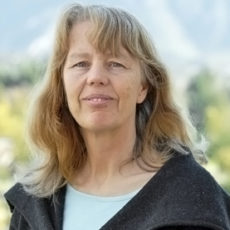
Uta Passow
Institution: University of California Santa Barbara, Marine Science Institute
Dr. Passow studies the functioning of the biological pump and marine carbon cycling, specifically carbon flux, in a changing world. She tries to gain a mechanistic understanding of processes which determine the flux of carbon in marine systems, now and in the future. As the structure of pelagic ecosystems and their functioning is changing so will the efficiency of the biological pump. Dr. Passow studies the factors and processes driving marine carbon cycling, both in the surface ocean (production, utilization, aggregation of carbon) and in the twilight zone, where loss of sinking particles due to dissolution, degradation or grazing is high. Currently she focuses on the impact of ocean acidification on carbon cycling and aggregation and on the consequences of the oil spill in the Gulf of Mexico in April, 2010, for marine snow and sedimentation.
Education: Ph.D., Biological Oceanography at Institute for Marine Science, University of Kiel, Germany, 1989
Continue reading...
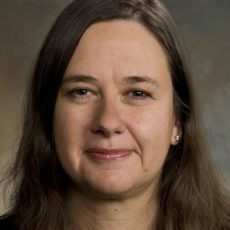
Antonietta Quigg
Institution: Texas A&M University, Department of Marine Biology
Dr. Quigg’s research interests include phytoplankton ecophysiology, physiological adaptation, photosynthesis, biological oceanography, biochemistry and biophysics, molecular biology, plant physiology, evolution (look around the website for more specific information). Dr. Quigg’s research is focused on phytoplankton as model organisms to address questions related to water, climate and energy. We use quantitative and experimental approaches to elucidate the importance of biotic and abiotic factors influencing phytoplankton dynamics (community composition, physiology, ecology) in both field and laboratory-settings. It is collaborative, multidisciplinary and international.
Another area of research in Dr. Quigg’s lab is phytoplankton as an alternative energy source. Phytoplankton grow rapidly, generate significant biomass on a small foot print using non-potable water with minimal nutrients. Their studies in this area have focused on multifactorial experiments examining requirements for light, nutrients (types and ratios) and temperature. By working with agricultural engineers, they are now addressing challenges associated with pond design and harvesting.
Education: Ph.D., (Biological Sciences), Monash University, Australia, 2000
Continue reading...
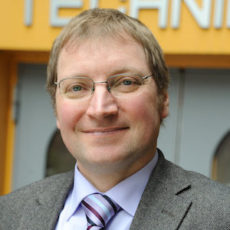
Michael Schlüter
Institution: Hamburg University of Technology, Institute of Multiphase Flow
Dr. Schlüter works on the analysis of transport phenomena in fluids with dispersed bubbles, droplets and solids—indispensable for most processes in chemical engineering, biotechnology and petro chemistry. Transport phenomena are investigated from micro-scale to commercially relevant length-scales to identify and overcome transport limitations for momentum, heat and mass transfer. By combining experimental research, modeling and numerical simulation a deep insight into the physical and chemical fundamentals of transport processes becomes possible, in order to enable or intensify chemical and biochemical reactions.
Continue reading...
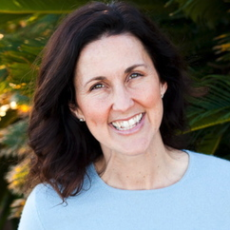
Cynthia Smith
Institution: National Marine Mammal Foundation
Dr. Smith is the Executive Director for the National Marine Mammal Foundation (NMMF). Smith is charged with furthering the nonprofit’s mission to improve and protect marine mammals, humans, and the oceans by integrating exceptional medical care with innovative science, humanitarian service, and public education. Dr. Smith also serves as Director of Medicine for the NMMF, overseeing a robust team of clinicians, specialists, and medical researchers. This highly specialized team provides expertise for numerous programs and projects in the areas of medicine, research, and conservation. Smith continues to lead multiple clinical research projects focused on marine mammal health and welfare. She has served as a technical and scientific consultant for government agencies involving veterinary & human health research, basic & applied biology, environmental science, biomedical engineering, neuroscience, neurotoxicology, diagnostic imaging, and advanced medical technology. Smith understands the importance of giving back locally and globally through scientific expertise and high-quality research to improve conservation efforts worldwide.
Education: Doctorate of Veterinary Medicine, Tufts University
Continue reading...
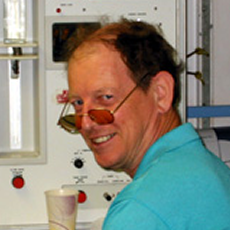
Piers Chapman
Institution: Texas A&M University (TAMU)
Dr. Chapman trained as a marine chemist and has worked in the UK, South Africa, and in the Gulf of Mexico. He formerly ran the US Office for the World Ocean Circulation Experiment at Texas A&M University, and then the Coastal Restoration and Enhancement through Science and Technology Program (CREST) office at Louisiana State University, which provides funding for research into coastal habitat restoration. Presently, he is Professor and Head of the Department of Oceanography at Texas A&M University in College Station, TX. His interests are in marine chemistry, particularly the chemistry of low oxygen regions, and the use of chemical tracers in large-scale oceanography. He has published widely on various topics and is currently working on a NOAA-funded project on hypoxia in the Gulf of Mexico.
GoMRI-funded project:
Gulf of Mexico Integrated Spill Response Consortium (GISR)
Education:
Ph.D. in Marine Chemistry, University of Wales, U.K.
Continue reading...
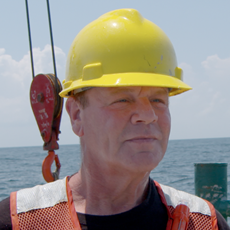
David Hollander
Institution: University of South Florida (USF)
Dr. Hollander’s research program focuses on evaluating the influence that anthropogenic and natural climate and environmental change have on the biogeochemical cycling of carbon, nitrogen, and other biolimiting elements in both modern and ancient lacustrine and marine settings. This research couples state-of-the-art analytical techniques in stable isotope and organic geochemistry in order to provide a detailed characterization of organic matter. The goals of his research are to understand how biological, chemical and physical processes in modern environments control the production, composition, alteration, decomposition and preservation of organic matter. The results of these studies in modern settings are applied to the analysis of ancient organic-rich sediments in order to reconstruct the environmental and climatic factors controlling the accumulation of organic matter throughout the geologic record.
GoMRI-funded project:
Center for Integrated Modeling and Analysis of Gulf Ecosystems (C-IMAGE)
Education:
Ph.D. Swiss Federal Institute of Technology (ETH), Zürich, Switzerland
Continue reading...
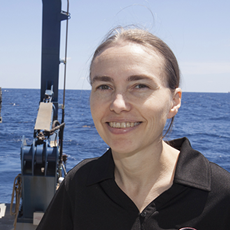
Samantha (Mandy) Joye
Institution: University of Georgia – Athens
Dr. Joye began her work on the microbiology and geochemistry of Gulf of Mexico cold seeps in 1994, first studying the process of aerobic methane oxidation and then turning her attention to the anaerobic oxidation of methane and sulfate reduction. Today, her work in the Gulf of Mexico examines the microbial inhabitants of gas hydrate and associated sediments as well as the microbial biogeochemistry of brine flows and mud volcanoes. Current projects focus on studying the distribution of archaea and bacteria and documenting rates of the anaerobic oxidation of methane and sulfate reduction in a variety of habitats at in situ pressure.
GoMRI-funded project:
Ecosystem Impacts of Oil and Gas Inputs to the Gulf (ECOGIG)
Education:
Ph.D. in Marine Sciences, University of North Carolina at Chapel Hill, North Carolina, U.S.A.
Continue reading...
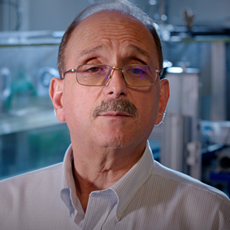
Joseph Katz
Institution: Johns Hopkins University
Dr. Katz is the director and co-founder of the Center for Environmental and Applied Fluid Mechanics (CEAFM) at JHU, and he manages the Laboratory for Experimental Fluid Dynamics, and the new Hopkins Heart Initiative. He also serves as the Chair, Board of Journal Editors of the American Society of Mechanical Engineers (ASME). He is a Fellow of ASME and of the American Physical Society (APS), as well as a JHU Gilman Scholar.
Dr. Katz research extends over a wide range of fields, with a common theme involving experimental fluid mechanics, and development of advanced optical diagnostics techniques for laboratory and field applications. His research groups has studied laboratory and oceanic boundary layers, flows in turbomachines, flow induced vibrations, behavior of marine plankton in the laboratory and in the ocean, as well as multiphase flows, including cavitation, bubble, and droplet dynamics in turbulent flows. He has co-authored more than 320 Journal and conference papers.
GoMRI-funded project:
Dispersion Research on Oil: Physics and Plankton Studies (DROPPS)
Education:
Ph.D., California Institute of Technology, Pasadena, California, U.S.A.
Continue reading...
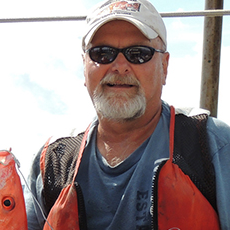
Steven Murawski
Institution: University of South Florida (USF)
Dr. Murawski is a fisheries biologist and marine ecologist involved in understanding the impacts of human activities on the sustainability of ocean ecosystems. He has developed approaches for understanding the impacts of fishing on marine fish complexes exploited in mixed-species aggregations. Additionally, his work on impacts of marine protected areas and other management options has formed the scientific basis for regulation.
As a co-founder of the CAMEO (Comparative Analysis of Marine Ecosystem Organization) program – a jointly funded program among NOAA Fisheries and the National Science Foundation – he has supported analyses of marine ecosystems throughout the nation. His current areas of interest include understanding the Gulf of Mexico Large Marine Ecosystem in terms of multiple, simultaneous stressors through the application of integrated ecosystem assessments. Such assessments can help inform investments to rebuild the Gulf of Mexico from effects of the oil spill, loss of juvenile nursery areas, nutrient enrichment, overfishing and other factors. Additionally, he is working on applying advanced technology solutions to the next generation of marine ecosystem surveys.
In addition to his science activities, Dr. Murawski is a USA Delegate and currently a vice-president of the International Council for the Exploration of the Sea (ICES), a 20-nation organization dedicated to increasing understanding of ocean ecosystems in the convention area, which includes the United States, Canada and 18 European countries.
GoMRI-funded project:
Center for Integrated Modeling and Analysis of Gulf Ecosystems (C-IMAGE)
Education:
Ph.D., University of Massachusetts-Amherst, Massachusetts, U.S.A.
Continue reading...
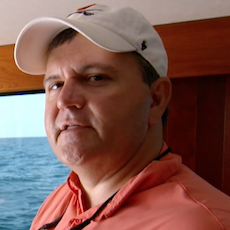
William (Will) Patterson
Institutions: Dauphin Island Sea Lab (DISL), University of South Alabama
Dr. Patterson is an Associate Professor at the Dauphin Island Sea lab, University of South Alabama. His research interests include population dynamics of marine and estuarine fishes with emphasis on processes affecting recruitment, connectivity among populations and life stage-specific habitat requirements of reef fishes.
GoMRI-funded project:
Center for Integrated Modeling and Analysis of Gulf Ecosystems (C-IMAGE Consortium)
Education:
Ph.D., University of South Alabama, Mobile, Alabama, U.S.A.
Continue reading...
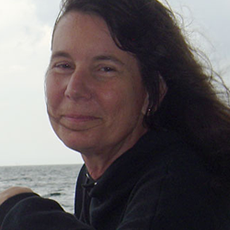
Nancy Rabalais
Institution: Louisiana Universities Marine Consortium (LUMCON)
Dr. Rabalais is the Executive Director and a Professor with the Louisiana Universities Marine Consortium (LUMCON). Her research interests include biological oceanography of continental shelf ecosystems influenced by large rivers, distribution and dynamics of hypoxic water masses, animal/sediment relationships, pelagic-benthic coupling, estuarine and benthic ecology, environmental effects of habitat alterations, effects of petroleum and chemical industries, eutrophication and effects of hypoxia.
GoMRI-funded projects:
Coastal Waters Consortium (CWC)
Education:
Ph.D., University of Texas, Austin, Texas, U.S.A.
Continue reading...
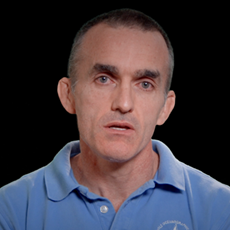
Christopher Reddy
Institution: Woods Hole Oceanographic Institution (WHOI)
Dr. Reddy has been the Director of the Coastal Ocean Institute at WHOI since 2008. His research focus is on applying and developing isotopic measurements for investigating the source, transport, and fate of organic contaminants in coastal and oceanic waters; chemical and physical interactions of organic contaminants with sedimentary organic matter; microbial degradation of persistent organic com-pounds; developing new analytical techniques for studying environmental chemistry; using organic geochemistry to solve problems in oceanography.
He teaches a course at WHOI and gives workshops for graduate and postdoctoral students on communicating science to non-scientist audiences. Dr. Reddy has published more than 140 manuscripts, two book chapters, and holds one patent.
GoMRI-funded projects:
Deepsea to Coast Connectivity in the Eastern Gulf of Mexico (DEEP-C)
Education:
Ph.D., Chemical Oceanography, University of Rhode Island, Kingston, Rhode Island, U.S.A.
Continue reading...
